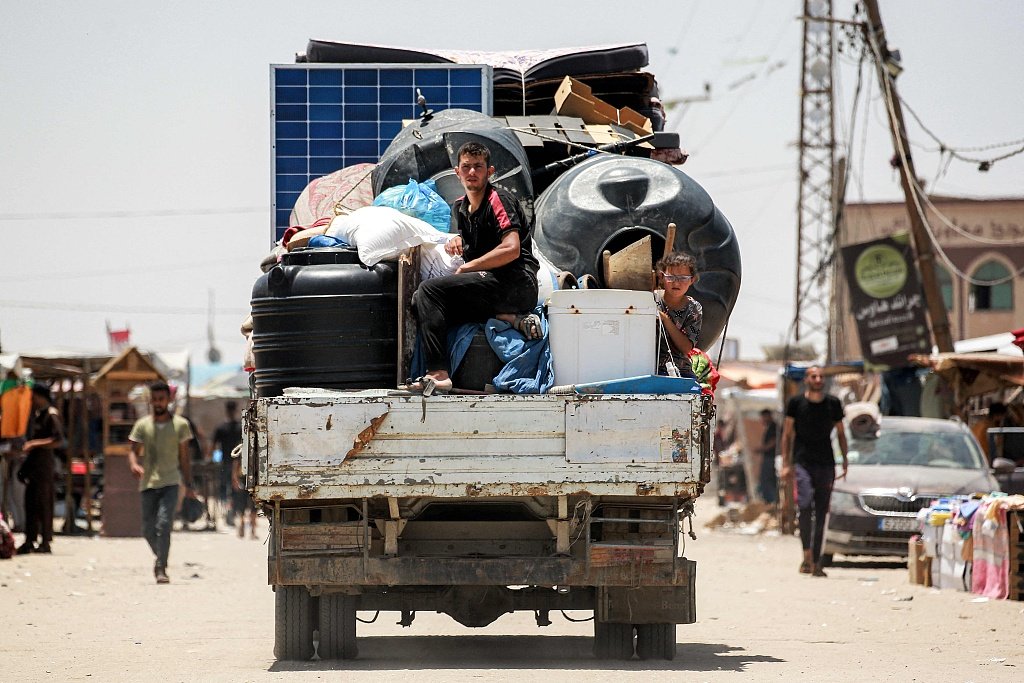GAZA/ SHARM EL-SHEIKH/ NEW DELHI: Two years after the October 7 Hamas attack that plunged Gaza into one of the deadliest and most destructive wars of the century, the region stands at a fragile crossroads between the exhaustion of endless conflict and a faint, flickering hope for peace.
On the war’s anniversary, Hamas signaled a willingness to engage in a U.S.-backed peace framework led by President Donald Trump, yet underscored that any deal must include a permanent ceasefire, a complete Israeli withdrawal, and the immediate reconstruction of Gaza under a Palestinian technocratic body. Israel, by contrast, insists on Hamas’ disarmament and political marginalization, a condition the group categorically rejects.
This renewed negotiation effort, taking place in Sharm el-Sheikh under Egyptian mediation, comes as both sides confront the devastating human and political toll of two years of relentless war. The conflict has killed over 67,000 Palestinians, displaced millions, and left Gaza’s infrastructure shattered beyond recognition. Senior Hamas official Fawzi Barhoum said in a televised statement that “the movement’s delegation is working to overcome all obstacles to reach an agreement that meets the aspirations of our people in Gaza.” Yet, the aspirations of ordinary Palestinians remain far more fundamental the desire to live without fear, to rebuild homes, to find loved ones buried under rubble, and to restore the basic rhythms of daily life destroyed by bombardment and siege.

For many in Gaza, the idea of peace remains both distant and necessary. “We are tired of living under smoke and dust,” said Mohammed Dib, a 49-year-old displaced father from Khan Younis. “It’s been two years of fear, horror, and destruction. We just want to live again.” His voice echoes across refugee camps where hope persists despite hunger and grief. Aid workers describe families rebuilding their homes from debris, teaching children in tents, and planting small gardens as symbolic acts of defiance quiet expressions of humanity in a landscape defined by loss.
President Trump’s re-engagement in Middle East diplomacy through his “Gaza Deal” represents both pragmatism and political theater. Unlike his earlier “Deal of the Century,” which prioritized Israeli security and Arab normalization, the current framework attempts to balance humanitarian urgency with a symbolic peace dividend. Trump’s optimism, “There’s a possibility we could have peace in the Middle East beyond Gaza,” projects confidence, but it also reflects Washington’s need to reclaim diplomatic relevance at a time when regional mediation has increasingly shifted toward other global powers. Egypt and Qatar have emerged as the operational brokers of dialogue, while China and Russia continue to expand influence through parallel alliances across the Middle East. The U.S. strategy, therefore, is as much about regaining strategic foothold as it is about achieving peace.
Yet, the path forward is uncertain. Hamas demands sovereignty and recognition, Israel demands disarmament and control, and both sides continue to see concessions as political vulnerability. Even Trump’s plan built on the idea of a phased ceasefire, hostage exchanges, and humanitarian corridors faces logistical and moral challenges. Officials admit that Trump’s 72-hour deadline for the release of hostages may be unachievable given the need to locate remains of those killed.
Moreover, questions over who will govern Gaza after the war and who will finance its colossal reconstruction remain unresolved. Trump and Netanyahu have ruled out a role for Hamas, yet no credible Palestinian or regional mechanism has been defined to fill the void.
As the talks in Sharm el-Sheikh gain momentum, the diplomatic stakes have risen sharply. With Qatar’s Prime Minister, Turkey’s intelligence chief, Jared Kushner, and real estate magnate Steven Witkoff all attending tomorrow’s session, it is clear that the pressure will be squarely on Hamas to demonstrate flexibility. The expanded participation signifies not only the weight of international mediation but also the convergence of political, security, and business interests shaping Gaza’s post-war future. The presence of Kushner, the architect of the earlier Abraham Accords adds a symbolic continuity to the Trump administration’s regional ambitions, while Qatar and Turkey’s involvement reinforces the regional consensus that a breakthrough, however fragile, must be achieved before the war’s devastation becomes irreversible.
Behind the negotiations lies a humanitarian reality that diplomacy often fails to capture. Gaza today is a geography of grief where neighborhoods have been erased, hospitals reduced to skeletons, and water systems destroyed. Yet amid the ruins, Palestinians continue to articulate a language of survival. “Our hope is small but alive,” said a young paramedic in Rafah. “Even when the sky is filled with fire, we believe that peace will come one day.” This fragile belief underscores the paradox of Gaza a territory where despair and resilience coexist in equal measure.
For Israelis, the trauma of October 7 remains unhealed. Families gathered this week at the site of the Nova music festival, where 364 young people were murdered, to remember the dead and demand the return of the remaining hostages. “They were supposed to get married on Valentine’s Day,” said Orit Baron, whose daughter Yuval was killed alongside her fiancé. “We buried them together because they were never apart.” Her grief mirrors that of countless families across Gaza a shared human tragedy that transcends politics and borders.
The anniversary has once again revealed the moral fatigue of a world witnessing two years of unending war. In European capitals and across Australia, small groups held protests demanding an end to Israel’s offensive, while Western governments remained cautious, balancing condemnation with political calculation. The global response exposes an uncomfortable truth that Gaza has become both a humanitarian catastrophe and a test of international credibility. For many in the Global South, the conflict underscores the failure of Western diplomacy to reconcile justice with security. From Pretoria to Brasília, leaders increasingly frame Gaza as the defining moral question of our era a measure of whether global governance can still protect civilian lives in the face of power asymmetry.
If the Sharm el-Sheikh talks are to move beyond symbolism, they must first acknowledge that the crisis in Gaza is not only political but existential. Every destroyed home, every lost child, and every displaced family is a reminder that the price of geopolitical inaction is human suffering. The war has not only redrawn Gaza’s physical map but also reshaped the emotional geography of an entire people who now carry collective trauma as their daily reality.
And yet, amid the rubble, there is still an insistence on life mothers sending children to makeshift schools, fathers rebuilding shattered walls, and youth documenting destruction with the hope that history will one day bear witness. It is this quiet perseverance that gives Gaza its moral gravity and global resonance.
The second anniversary of the war is not merely a date on the calendar; it is a mirror reflecting the failures of leadership and the limits of international diplomacy. If peace is to have meaning, it must begin not in negotiating rooms but in acknowledging the shared humanity that survives every airstrike. For Palestinians, the demand is not victory but dignity the right to live, rebuild, and hope. For Israelis, it is security and closure. Between these two unfulfilled aspirations lies the challenge of our time: whether politics can finally align with conscience.
Gaza’s greatest resource today is not its shattered land but its unbroken resilience a defiant belief that even in the darkest corners of war, the human spirit still reaches for light. As diplomats debate and politicians posture, the people of Gaza continue to embody the most profound truth of all that peace is not negotiated; it is lived, imagined, and, above all, endured.
– Dr. M Shahid Siddiqui | WNN I Follow via X @shahidsiddiqui
WATCH, LIKE and SUBSCRIBE CHANNEL FOR GLOBAL NEWS and EXCLUSIVE TALKS

















